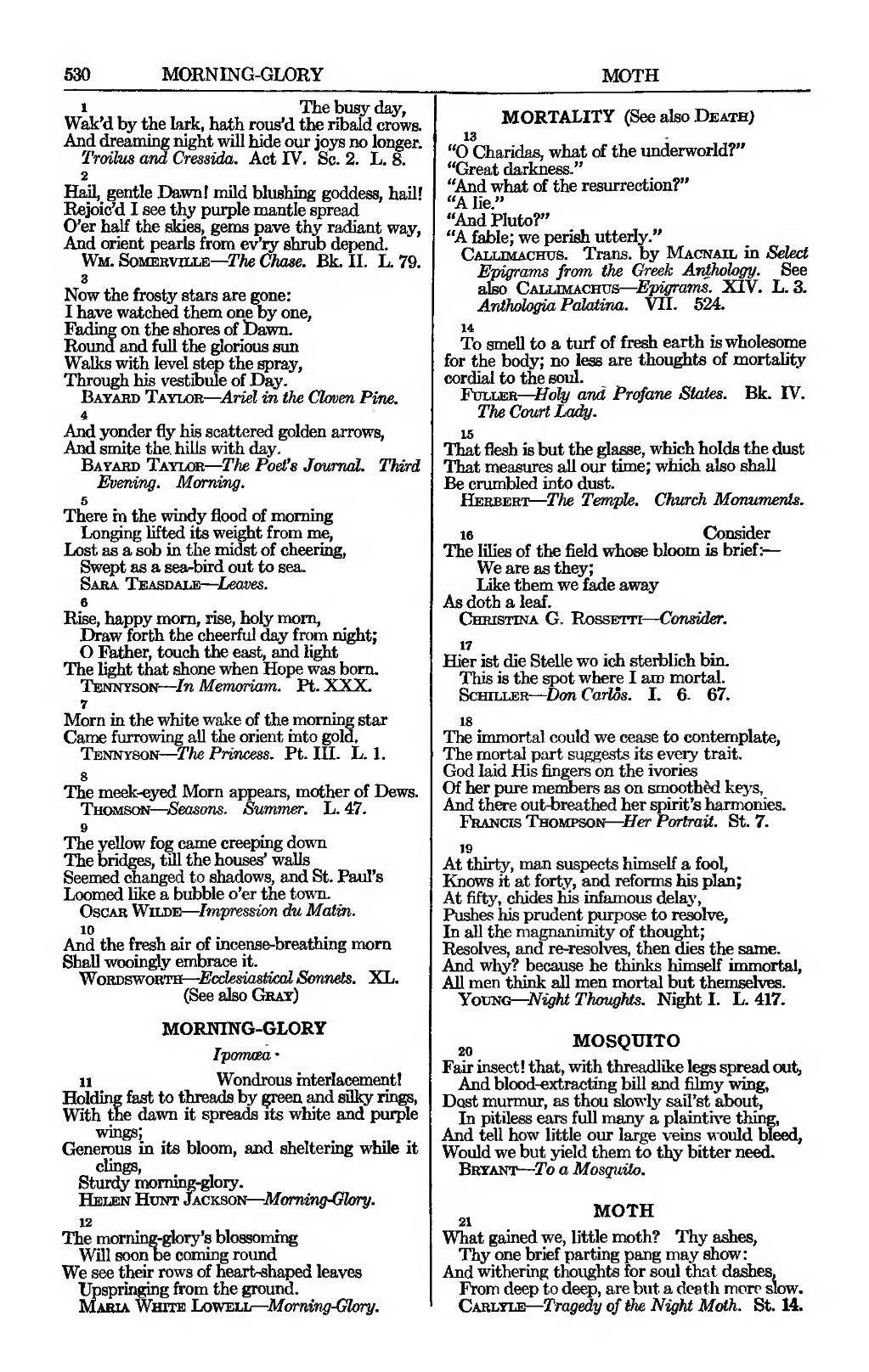530 MORNING-GLORY MOTH
The busy day,
Wak'd by the lark, hath rous'd the ribald crows.
And dreaming night will hide our joys no longer.
Troilus and Cressida. Act IV. Sc. 2. L. S.
Hail, gentle Dawn! mild blushing goddess, hail!
Rejoic'd I see thy purple mantle spread
O'er half the skies, gems pave thy radiant way,
And orient pearls from ev'ry shrub depend.
Wm. Sombbvillb—The Chase. Bk. II. L. 79.
Now the frosty stars are gone:
I have watched them one by one,
Fading on the shores of Dawn.
Round and full the glorious sun
Walks with level step the spray,
Through his vestibule of Day.
Batahd Taylor—Ariel in the Cloven Pine.
And yonder fly his scattered golden arrows,
And smite the. hills with day.
Bayard Taylor—The Poet's Journal. Third
Evening. Morning.
There in the windy flood of morning
Longing lifted its weight from me,
Lost as a sob in the midst of cheering,
Swept as a sea-bird out to sea.
Sara Teasdale—Leaves.
Rise, happy morn, rise, holy morn,
Draw forth the cheerful day from night;
O Father, touch the east, and light
The light that shone when Hope was born.
| author = Tennyson
| work = In Memoriam. Pt. XXX.
Morn in the white wake of the morning star
Came furrowing all the orient into gold,
| author = Tennyson
| work = The Princess. Pt. III. L. 1.
The meek-eyed Morn appears, mother of Dews.
Thomson—Seasons. Summer. L. 47.
The yellow fog came creeping down
The bridges, till the houses' walls
Seemed changed to shadows, and St. Paul's
Loomed like a bubble o'er the town.
| author = Oscar Wilde
| work = Impression du Matin.
And the fresh air of incense-breathing morn
Shall wooingly embrace it.
Wordsworth—Ecclesiastical Sonnets. XL.
| seealso = (See also {{sc|Gray)
MORNING-GLORY
IpomoeaII Wondrous interlacement!
Holding fast to threads by green and suky rings,
With the dawn it spreads its white and purple
Generous in its bloom, and sheltering while it
Sturdy morning-glory.
| author = Helen Hunt Jackson
| work = Morning-Glory.
The morning-glory's blossoming
Will soonbe coming round
We see their rows of heart-shaped leaves
Upspringing from the ground.
Maria White LowELii—Morning-Glory.
MORTALITY
| seealso = (See also {{sc|Death;
"O Charidas, what of the underworld?"
"Great darkness."
"And what of the resurrection?"
"A lie."
"And Pluto?"
"A fable; we perish utterly."
Callimachus. Trans, by Macnail in Select
Epigrams from the Greek Anthology. See
also Callimachus—Epigrams. XIV. L. 3.
Antholagia Palatina. VII. 524.
To smell to a turf of fresh earth is wholesome
for the body; no less are thoughts of mortality
cordial to the soul.
Fuller—Holy and Profane States. Bk. IV.
The Court Lady.
That flesh is but the glasse, which holds the dust
That measures all our time; which also shall
Be crumbled into dust.
| author = Herbert
| work = The Temple. Church Monuments.
Consider
The lilies of the field whose bloom is brief:—
We are as they;
Like them we fade away
As doth a leaf.
Christina G. Rossetti—Consider.
Hier ist die Stelle wo ich sterblich bin.
This is the spot where I am mortal.
Schiller—Don Carlos. I. 6. 67.
The immortal could we cease to contemplate,
The mortal part suggests its every trait.
God laid His fingers on the ivories
Of her pure members as on smoothed keys,
And there out-breathed her spirit's harmonies.
Francis Thompson—Her Portrait. St. 7.
At thirty, man suspects himself a fool,
Knows it at forty, and reforms his plan;
At fifty, chides his infamous delay,
Pushes his prudent purpose to resolve,
In all the magnanimity of thought;
Resolves, and re-resolves, then dies the same.
And why? because he thinks himself immortal,
All men think all men mortal but themselves.
Young—Night Thoughts. Night I. L. 417.
MOSQUITO
Fair insect! that, with threadlike legs spread out,
And blood-extracting bill and filmy wing,
Dost murmur, as thou slowly sail'st about,
In pitiless ears full many a plaintive thing,
And tell how little our large veins would bleed,
Would we but yield them to thy bitter need.
Bryant—To a Mosquito.
MOTH
What gained we, little moth? Thy ashes,
Thy one brief parting pang may show:
And withering thoughts for soul that dashes.
From deep to deep, are but a death moir slow.
Carlyle—Tragedy of the Night Moth. St. 14.
